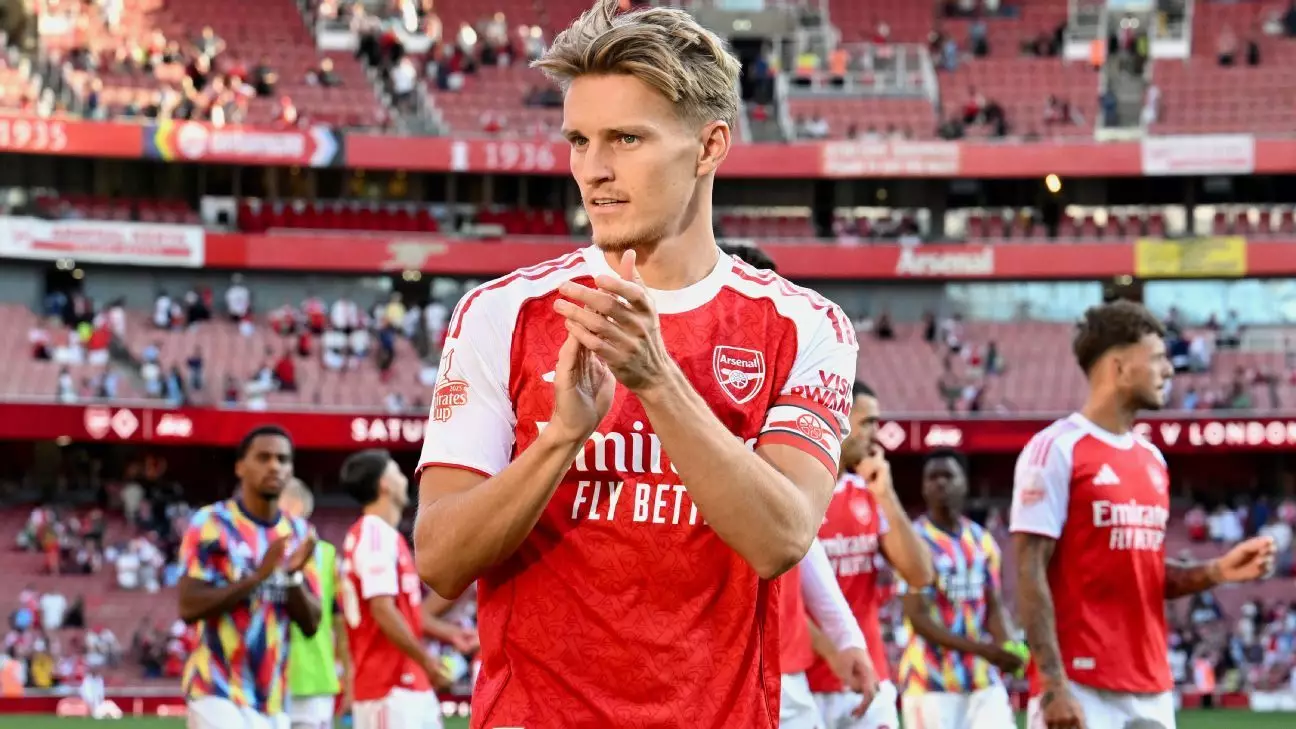Leadership in football, much like in any team sport, isn’t just about wearing a badge or holding a position; it’s about embodying the qualities that rally a squad and inspire winning. Mikel Arteta’s recent defend of Martin Ødegaard’s captaincy underscores that decision-making isn’t solely based on experience but on trust, consensus, and the perceptions of those within the squad. While football pundits and former legends like Tony Adams emphasize traditional leadership qualities—certainly valuable—modern football increasingly recognizes emotional intelligence, consistency, and the respect of peers as core attributes of effective captaincy.
Adams’ critique—that Arsenal “are not going to win the league with Ødegaard as captain”—appears rooted in a conventional view of leadership, where physical presence and commanding stature are paramount. Yet, Arteta’s response reveals a broader, more nuanced understanding: leadership must be backed by the players themselves. A captain who commands respect internally is more influential than one who simply holds a title. The players’ vote, overwhelmingly favoring Ødegaard, is a clear indicator that within the collective psyche of Arsenal, he is perceived as the most suitable figure to lead. This isn’t a matter of ego or sentimentality; it’s a strategic acknowledgment that genuine leadership originates from within the squad, not from external expectations.
By choosing to uphold the current captaincy, Arteta emphasizes unity and trust, illustrating an approach that arguably aligns with contemporary sports psychology more than traditional hierarchies. This internal consensus serves as the foundation for a cohesive team where leadership is rooted in mutual respect rather than mere tradition. It’s a reminder that successful teams are built from collective confidence—an ethos that can often be underestimated in the pursuit of structural clichés.
Leadership Beyond the Front Seat: Culture, Confidence, and Authenticity
Leadership in football extends into the culture of the club, influencing everything from training sessions to match-day resilience. Arteta’s decision not to follow Adams’ recommendation of Declan Rice as captain demonstrates that effective leadership isn’t necessarily about the most obvious or veteran figure but about who the players feel most supported and inspired by. It speaks to a broader question of authenticity—who genuinely represents the spirit of the team and instills belief?
It isn’t enough to appoint a captain based on experience or reputation; that individual must resonate with the squad. The fact that Arteta’s squad preferred Ødegaard over other candidates shows that internal dynamics, mutual respect, and perceived leadership skills matter more than external attributes. This decision signifies a mature understanding that leadership is an evolving trait, often demonstrated more convincingly internally than in the limelight.
Furthermore, it underscores a shift in football leadership philosophy—more players now recognize the importance of psychological support and team chemistry over traditional hierarchy. Arsenal’s approach is a microcosm of modern football’s evolution: emphasizing the importance of collective effort, trust, and shared purpose over static authority. This could be the secret ingredient for sustained success, as players are more likely to follow someone they believe is genuinely committed and respected by their peers.
Strategic Leadership and Its Impact on Performance and Discipline
The debate surrounding leadership also intersects with issues of discipline, especially in context of recent rule changes that aim to curb time-wasting and gamesmanship. Arteta’s mention of the league’s efforts to clamp down on offenses—like excessive ball-kicking or goalkeeper time-wasting—relates to how leadership is vital beyond the pitch. A team’s success depends on maintaining focus, self-control, and adaptability, qualities that a captain exemplifies.
Arteta’s emphasis on respect for new regulations suggests he values leadership that promotes professionalism, resilience, and tactical discipline. His openness about recent disciplinary actions—sending players off for petty infringements—indicates that leadership isn’t just about motivating but also about enforcing standards. An effective captain must model these standards, inspiring teammates to adapt to evolving rules and maintain focus under pressure.
The challenge for Arsenal is ensuring that such discipline becomes ingrained rather than reactionary. Arteta appears confident that with clear communication and shared values, the team can navigate the new rule environment smoothly. This not only influences on-field performance but also shapes the team’s identity beyond results—crafting a culture of respect, tenacity, and collective responsibility.
The Future of Arsenal’s Leadership Model: A Reflection of Modern Football
Ultimately, Arteta’s unwavering support for Ødegaard symbolizes a broader shift in how leadership is conceived within top-tier clubs. It’s no longer solely about vocal authority or towering presence but about earning respect through actions, consistency, and empathy. This approach resonates with the changing landscape of football—one where mental resilience, team cohesion, and player-led credibility often trump superficial hierarchies.
By trusting his squad’s judgment, Arteta demonstrates confidence in the collective wisdom and emotional intelligence of his players. Such decisions might challenge traditional norms but could also pave the way for more inclusive and effective leadership models across the sport. In an era that increasingly values diversity of thought and authenticity, Arsenal’s endorsement of Ødegaard might serve as a blueprint for clubs aiming to build resilient, motivated, and united teams.
In the end, leadership rooted in trust and mutual respect might be Arsenal’s most potent weapon in their quest for league dominance. If the players believe in their captain and see him as a true reflection of their aspirations, that internal conviction could translate into the unwavering unity needed to conquer the challenges ahead.


Leave a Reply